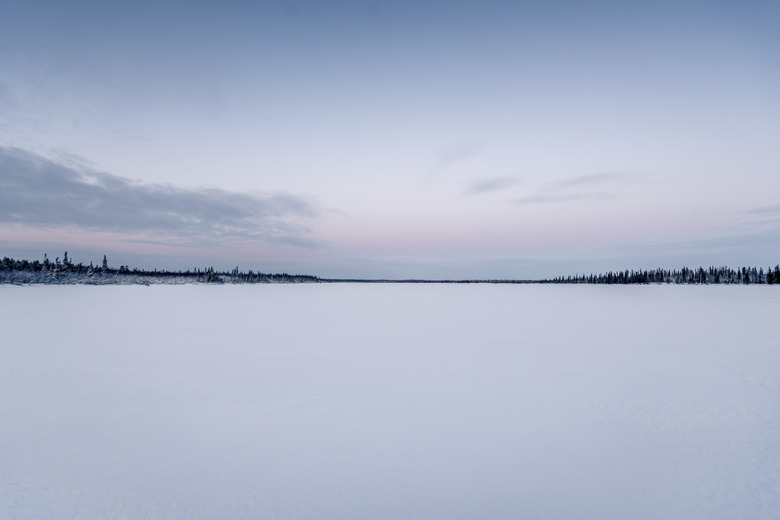Here's What You'd Really See If You Visited The North Pole
We've all seen the illustrations of the North pole: Santa's sleigh, plenty of reindeer (red-nosed and otherwise) and a massive toy factory packed with elves.
So how does the reality measure up? Well, scientists haven't discovered Santa's crew at the North pole (yet!). But they have found unique animals, deep sea life and an expanse of ice affected by climate change. Read on to learn what you'd really find if you trekked to the North pole – and save yourself the trip.
First Thing's First: There are Four North Poles
First Thing's First: There are Four North Poles
Yup, the "North pole" location changes depending on which one you're talking about. There's the terrestrial North pole, which is the visual "top" of the earth – the region where the globe frame connects to the top of the globe in the photo below.
There's also the magnetic North pole, also called the Dip North pole – the place your compass points to when it's pointing north. The magnetic north pole actually moves over time – over the last 100 years, it's made its way from Greenland to arctic Canada.
And there's a geomagnetic North pole. Its location is based on mathematical models based on what we know about earth's magnetic field.
Finally, there's the Northern pole of inaccessibility. This pole isn't based on any magnetic or geomagnetic properties – or even anything very scientific. It's just the point in the Arctic Ocean that's farthest from land.
While all four North poles have slightly different locations, they're all (surprise!) located in the deep north and have some seriously arctic weather conditions.
A Thinning Polar Ice Cap
A Thinning Polar Ice Cap
It's no shock that the North pole is seriously cold – but did you know just how cold? Frigid temperatures run from from -40 degrees Fahrenheit in the winter to about 0 degrees Fahrenheit in the summer. Year-long cold temps mean the North pole is covered in ice: up to 5.8 million square miles of it during the winter.
At least, it is for now. Global warming has increased the polar ice cap's partial summer melt, and lead to cracks throughout the ice. And while Arctic ice is typically 6 to 9 feet thick (and up to 15 feet in some regions) it's getting thinner. Scientists think that the ice will thin enough that ships will be able to sail through the north pole, aided by icebreakers, by 2050.
An Assortment of Arctic Animals
An Assortment of Arctic Animals
Head to the North pole and you'll also find arctic wildlife well adapted to the cold. Like polar bears, the region's largest land mammal. And arctic foxes, who can survive in the barren arctic by eating anything they can find: eggs, berries, smaller animals – even animal carcasses. You'll also find ring seals – prime food for polar bears – and seagull-like birds like the black-legged kittiwake and northern fulmar.
Under the ice, you'll find a variety of shrimp and other amphipods. And in the deep waters of the ocean are home to the North pole sea anemone, which were first discovered by Russian explorers over 2.5 miles under the ice crust.
...And a Crazy Conspiracy Theory
...And a Crazy Conspiracy Theory
Trekking to the North pole is so grueling that only a few adventurers go there each year. And with the mystery of being one of the least visited places on earth, the North pole is the subject of a few conspiracy theories.
The craziest one of all? The hollow earth theory: the idea that the North pole really contains a hole that leads to the center of the earth – which is filled with human-alien hybrids, Nazis and Vikings. If it sounds ridiculous, it is! But believers felt strongly enough that they tried (unsuccessfully) to organize a $20,000-per-person expedition and find it.
Needless to say, there's no pathway to alien-human civilization in the North pole. But ring seals and polar bears are adorable, so isn't reality better anyway?
Cite This Article
MLA
Tremblay, Sylvie. "Here's What You'd Really See If You Visited The North Pole" sciencing.com, https://www.sciencing.com/heres-what-youd-really-see-if-you-visited-the-north-pole-13715437/. 10 December 2018.
APA
Tremblay, Sylvie. (2018, December 10). Here's What You'd Really See If You Visited The North Pole. sciencing.com. Retrieved from https://www.sciencing.com/heres-what-youd-really-see-if-you-visited-the-north-pole-13715437/
Chicago
Tremblay, Sylvie. Here's What You'd Really See If You Visited The North Pole last modified August 30, 2022. https://www.sciencing.com/heres-what-youd-really-see-if-you-visited-the-north-pole-13715437/

